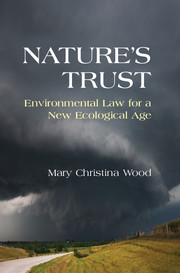Book contents
- Frontmatter
- Dedication
- Contents
- Preface
- Acknowledgments
- Part I Environmental Law: Hospice for a Dying Planet
- Introduction “You Can’t Negotiate with a Beetle”
- 1 “You Are Doing a Great Job”
- 2 Modern Environmental Law: The Great Legal Experiment
- 3 The Politics of Discretion
- 4 Behind the Grand Façade
- 5 The Administrative Tyranny over Nature
- Part II The People’s Natural Trust
- Part III The Public Trust and the Great Transition
- Notes
- Index
3 - The Politics of Discretion
Published online by Cambridge University Press: 05 June 2014
- Frontmatter
- Dedication
- Contents
- Preface
- Acknowledgments
- Part I Environmental Law: Hospice for a Dying Planet
- Introduction “You Can’t Negotiate with a Beetle”
- 1 “You Are Doing a Great Job”
- 2 Modern Environmental Law: The Great Legal Experiment
- 3 The Politics of Discretion
- 4 Behind the Grand Façade
- 5 The Administrative Tyranny over Nature
- Part II The People’s Natural Trust
- Part III The Public Trust and the Great Transition
- Notes
- Index
Summary
Agency discretion operates as a pressure point in environmental law. It determines whether regulatory outcomes will serve the public or polluters. Industry knows that discretion sets an open season to lobby officials into bending the law to their favor. As Professor Houck warned in the Forest Service context, “[Discretion] throws [the] biologists, field managers, and forest rangers to the dogs…. [They] have no shield when the pressure comes on.”
After years of such pressure, an agency falls captive to the industry it regulates. At that point, government officials look at the industry in a different light – as a client the agency must serve. Discretion then becomes a legal conduit through which the agency delivers public resources directly into corporate hands. Houck put it bluntly as to the U.S. Forest Service: “The code words fool no one involved: more ‘discretion’ means that industry gets to cut more timber.”
The wrongful transfer of public resources to private interests in response to political pressure takes place behind a veil of legitimization provided by environmental law. Citizens rarely discover the inl uence of politics, and if they do, the solid proof usually arrives years after the wrongdoing takes place and decisions become i nal. Facts come to light through very limited avenues: from courageous whistleblowers, persistent investigative journalists, dedicated public-interest lawyers (who sue the agency and gain documents through the discovery process), or as a result of formal investigations launched by congressional oversight committees, the Office of Inspector General, or the Government Accountability Office. In relation to the mass numbers of environmental permits that issue from state and federal agencies, these investigations are exceedingly rare.
- Type
- Chapter
- Information
- Nature's TrustEnvironmental Law for a New Ecological Age, pp. 68 - 83Publisher: Cambridge University PressPrint publication year: 2013



